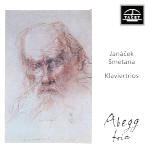It’s common knowledge among Janácekians (Janácekers?) that the First String Quartet began life as a piano trio, most of which was either lost or destroyed. The notes included here are a little vague as to just how much of the original survived to serve as the basis of this reconstruction by Michal Hájku, but no matter. Anyone who loves this composer will certainly want to hear it, and the Abegg Trio plays with the kind of commitment and passion that the music requires. Still, it has to be acknowledged that Janácek’s final thoughts were right: no piano trio can transmit the sadness that suffuses the opening of the finale the way that muted strings can. This fascinating experiment makes a fine foil to a similarly excellent performance of Smetana’s strangely neglected single work in the trio medium. The Abegg manages to differentiate the tempos and emotional nuances of the first two movements (otherwise so similar) with notable success, and the Presto finale has an athletic vigor that comes from elasticity of rhythm and supple phrasing rather than mere speed. As usual, Tacet’s sonics are gorgeous. Definitely worth a listen.
































